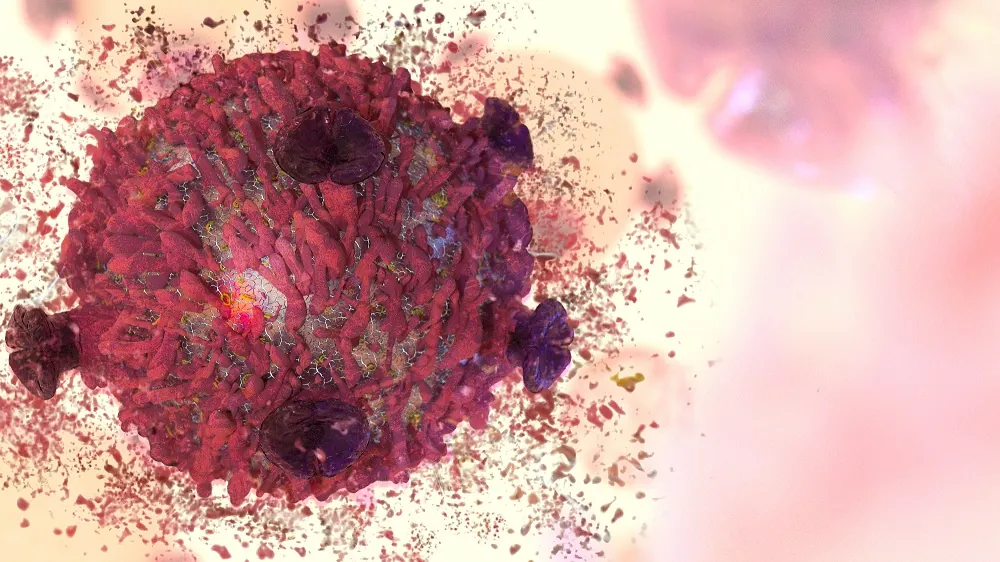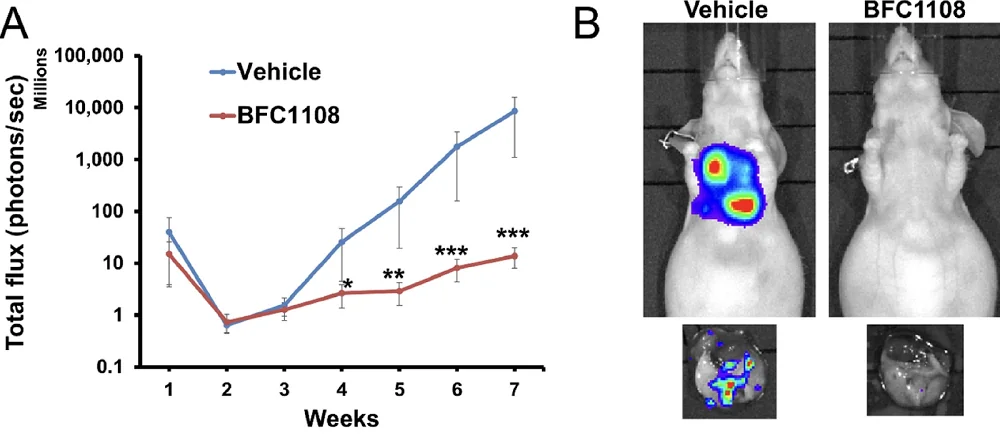Novel Drug Suppresses Metastatic Cancer in Mice
- The cancer cells are killed by what kept them alive.

Scientists have found a small molecule that turns an anti-apoptotic protein into a pro-apoptotic one, protecting against deadly metastases in a mouse model of human triple-negative breast cancer and, potentially, in other cancers [1].
Small but mighty
With cutting-edge cancer treatments now including things like antibodies and genetically engineered T-cells, small molecules seem to have fallen out of fashion. However, they can still pack a punch, if you find the right one (for instance, recently, a small molecule was discovered that extends telomeres). In this new study, researchers from Oregon State University have reported on a novel small molecule that can modify a protein ubiquitous in some cancer cells, turning it from a foe into an ally.
The protein, Bcl-2, prevents apoptosis (cellular death) in cancer cells, protecting them from intracellular self-destruction programs. Bcl-2 plays a role in many types of cancer. Previous research has discovered molecules that effectively modulate Bcl-2 in lymphomas, but solid tumors proved to be a harder target.
The cellular turncoat
In this study, the researchers started with triple-negative breast cancer, a subtype that lacks the three receptors commonly expressed in breast cancer and is considered particularly dangerous. Using modern methods of high-throughput screening, they were able to test a lot of molecules in vitro, in cancerous cells, assessing the effect on viability.
The leading compound, BFC1108, potently reduced the viability of several types of cancer cells in a dose-dependent manner. Bcl-2 knockdown cells were resistant to the treatment, showing that the molecule indeed worked on this specific protein.
The researchers then established that the reduced viability was due to increased apoptosis. Interestingly, the more Bcl-2 that cells expressed, the more vulnerable they were to apoptosis. As the team hoped, the new molecule did actually turn Bcl-2 from anti-apoptotic to pro-apoptotic, instead of just deactivating it, so more Bcl-2 means a stronger apoptotic impact.
“Cancer cells are so smart, they figure out ways to survive,” said Siva Kolluri, professor of environmental and molecular toxicology in the College of Agricultural Sciences, and the lead author on the paper. “Many therapies do work for a while, but it’s like making a car stop only to have the car move again. Here, we’re completely taking the wheels off the car. We used the same Bcl-2 pathway but fundamentally made a new discovery: changing how this protein functions so it starts killing cancer cells.”
Metastasis prevention
In vivo, BFC1108 strongly inhibited the growth of tumors in mice after they were inoculated with human breast cancer cells. Staining for apoptosis proteins revealed greatly increased apoptotic activity.
While science has made great strides against non-metastatic cancers, it struggles with metastatic ones. In triple-negative breast cancer, survival rates are about 90% for patients with localized tumors, but drop to just 12% for metastatic tumors. This holds true for many other cancers.
The researchers were thrilled to find that BFC1108 was effective against metastatic tumors as well. In a mouse model of metastatic triple-negative breast cancer, the study group had almost no metastases in the lungs (the organ that breast cancer usually metastasizes to). Importantly, the treated mice did not lose weight in the process.

“This is very promising because many metastatic cancers have high Bcl-2 levels,” said Christiane Löhr, professor of anatomic pathology in the Carlson College of Veterinary Medicine and a co-author of the paper. “This increased Bcl-2 expression is also common in cancer that has become resistant to therapies.”
Bcl-2 is also associated with liver metastasis in colorectal cancer, lymphovascular invasion of breast cancer cells, and nodal metastasis and invasion in laryngeal squamous cell carcinoma [2]. This makes BFC1108 a potential game changer for many cancer patients with bad prognoses.
“Changing the conformation of Bcl-2 and using that pathway to kill cells is a distinctively different approach than has been tried before.”, Löhr said. “Altering the function of a protein in a live cell is pretty amazing and the potential to attack cancers that have escaped other treatments, while leaving normal cells intact, is there.”
In this study, we identified BFC1108, a small molecule Bcl-2 functional converter, that suppresses primary and metastatic breast cancers in mouse xenograft models. Bcl-2 and its family members are prime molecular targets for developing new cancer therapeutics. There have been several efforts in the development of Bcl-2 inhibitors for solid cancers, but not with very encouraging results in clinical trials. Our study provides a proof of concept for the therapeutic targeting of Bcl-2 through the use of small molecules that induce the Bcl-2 killer conformation.
Literature
[1] Kopparapu, P. R., Pearce, M. C., Löhr, C. V., Duong, C., Jang, H. S., Tyavanagimatt, S., … & Kolluri, S. K. (2024). Identification and characterization of a small molecule Bcl-2 Functional Converter. Cancer Research Communications, 4(3), 634-644.
[2] Um, H. D. (2016). Bcl-2 family proteins as regulators of cancer cell invasion and metastasis: a review focusing on mitochondrial respiration and reactive oxygen species. Oncotarget, 7(5), 5193.








